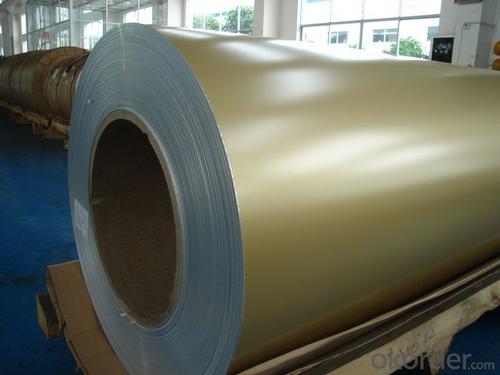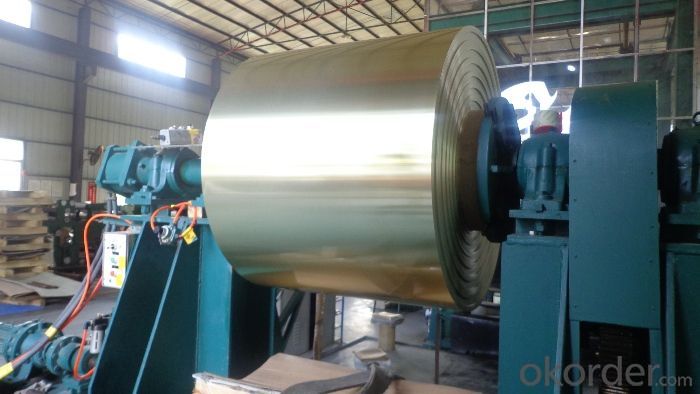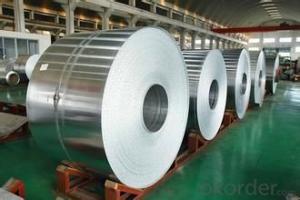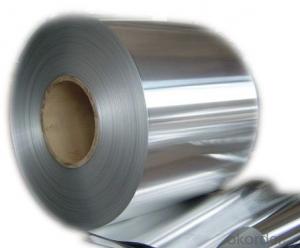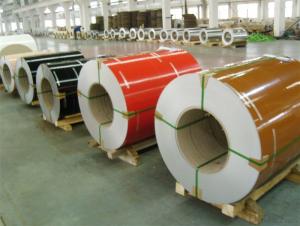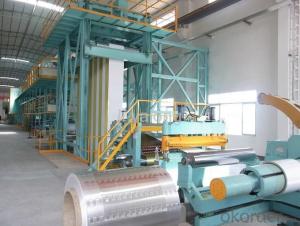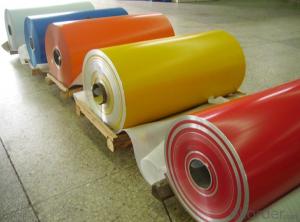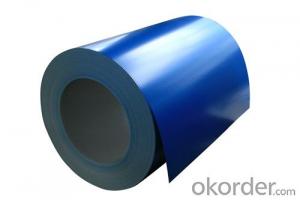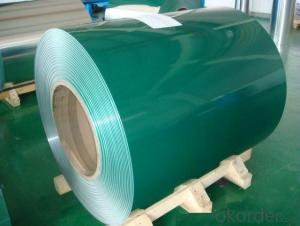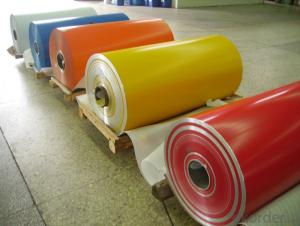Perforated PVDF Coated Aluminum Coils 3004 Alloy for Building Materials
- Loading Port:
- Yantai
- Payment Terms:
- TT OR LC
- Min Order Qty:
- 7 m.t.
- Supply Capability:
- 200 m.t./month
OKorder Service Pledge
OKorder Financial Service
You Might Also Like
Specification
1.Structure of PVDF Coated Aluminum Coils 3004 Alloy for Building Materials
We normally used PVDF coated aluminum coils 3003 for building materials.
3003 is very good in high strength, corrosion resistance, high weather resistance and other characteristics.
Embossed aluminum sheets have many advantages. Embossing can not only increase thickness of aluminum, but also enhance strength and rigidity of aluminum coils. Embossed & coated aluminum coils look more beautiful and widely used in decorations.
2. Main Features of PVDF Coated Aluminum Coils 3004 Alloy for Building Materials
• Light Weight
• Good in strength and rigidity
• High Flatness
• Good Weathering
• Colorful
• Recycling
• Saving Energy
• Rust proof
3. PVDF Coated Aluminum Coils 3004 Alloy for Building Materials Images
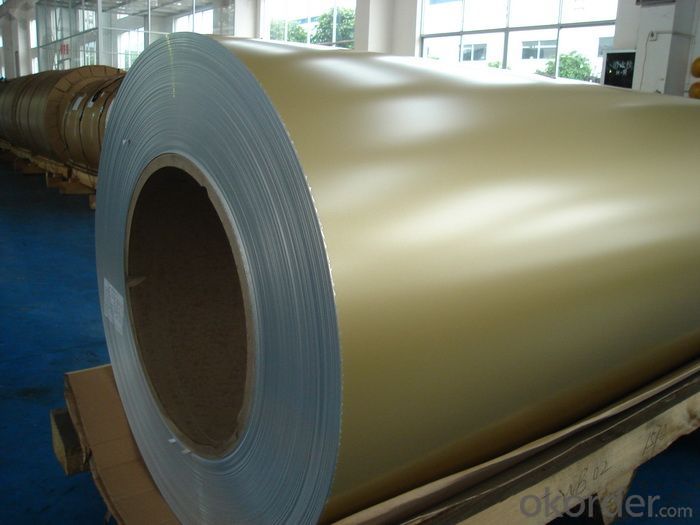
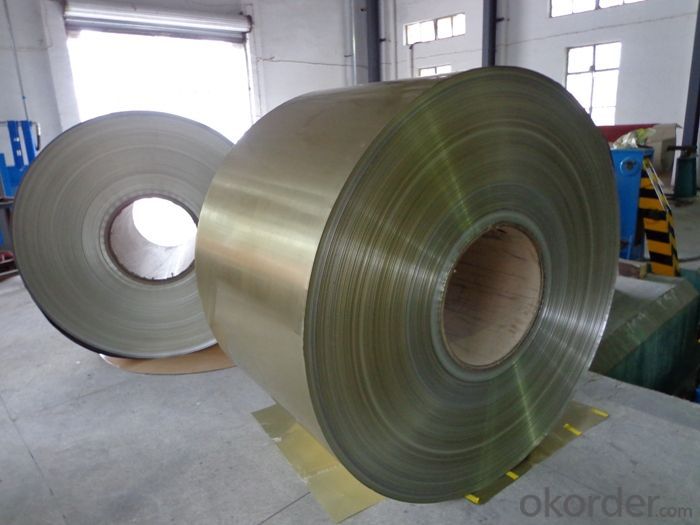
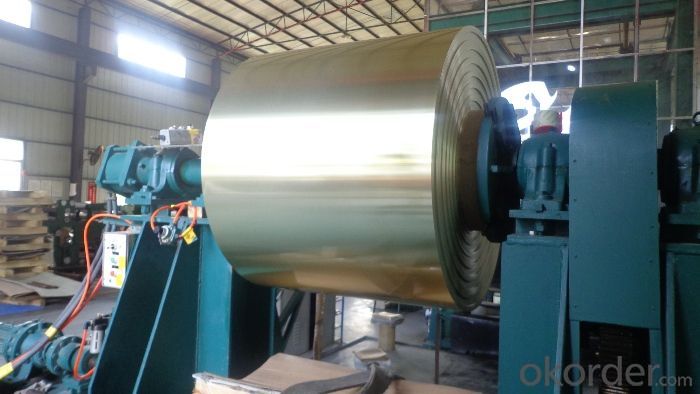
4. Specification of PVDF Coated Aluminum Coils 3004 Alloy for Building Materials
ALLOY | TEMPER | THICKNESS | WIDTH | COATING and COLOR |
3003, 3105, etc | H44, etc | 0.2-0.6mm | Less than1600mm | AS PER YOUR REQUIREMENTS |
5. FAQ
A.What about inspections to guarantee quality?
For each order, we will arrange strict inspection for raw materials, inspection during production and inspection for finished goods.
With requirement of customers, we also can arrange the third party inspection.
B.What about delivery?
We will put order in production schedule after order gets confirmed against copy of TT or L/C. Normally it takes about one month for production. Exact shipment schedule is different based on different sizes and quantity.
C.What is the MOQ?
5 tons for each size.
D. Where have you exported?
We have exported to many countries. Main markets include South East Asia, Middle East, North America, South America, etc.
- Q: I'm doing a science project on Aluminum and need to know what the other metals are in the following ores:BauxiteCryoliteGibbsiteI have to know what percentage of it is which metal. Don't know if that makes much sense, but I really need help because I can't find the answer anywhere. Thanks :D
- The bauxite is a sedimentary rock of chemical origin composed for the most part by alumina (Al2O3) and, in smaller measure, iron oxide and silica. It is the main aluminum source used by the industry. It is a residual taken place by the meteorización of the igneous rocks under conditions geomorfológicas and climatic favorable. Molecular formula: Na3AlF6 Synonym: Fluoroaluminato of sodium. Chemisorption of catechol on gibbsite, boehmite, and noncrystalline alumina... Alumina; Aluminium Oxyhydroxyde
- Q: How are aluminum coils protected against mechanical damage?
- Aluminum coils are protected against mechanical damage through several methods. One of the primary ways is by applying a protective coating or finish to the surface of the coil. This coating acts as a barrier between the coil and any potential sources of mechanical damage, such as impact or abrasion. The coating can be a paint or a specialized coating designed specifically for aluminum, which provides enhanced durability and resistance to scratching or denting. In addition to the protective coating, aluminum coils may also be reinforced with a layer of laminate or film. This additional layer adds an extra level of protection against mechanical damage and can help prevent dents or scratches from occurring. The laminate or film can be applied during the manufacturing process or added as a separate step after the coil has been produced. Furthermore, aluminum coils may be wrapped or packaged in protective materials such as plastic or foam to minimize the risk of mechanical damage during transportation or storage. These protective wrappings help cushion the coil and provide a barrier against impacts or heavy objects that could potentially cause damage. Overall, the combination of protective coatings, laminates, and packaging materials helps to ensure that aluminum coils are adequately protected against mechanical damage. These measures help to maintain the integrity and quality of the coils, allowing them to perform effectively in various applications.
- Q: What are the different types of surface finishes for decorative purposes?
- For decorative purposes, a variety of surface finishes are commonly used. These finishes can improve the appearance of a surface by adding texture, depth, and visual interest. Some of the most popular surface finishes for decorative purposes include: 1. Polished: Achieving a smooth and shiny surface, polished finishes create a reflective appearance. This glossy look is obtained by using abrasive materials to polish the surface. 2. Matte: Matte finishes have a flat and non-reflective surface. They are achieved by using sandpaper or other materials to create a smooth yet dull appearance. Matte finishes are often chosen for a more subtle and understated aesthetic. 3. Brushed: Creating a distinctive linear pattern, brushed finishes are achieved by brushing the surface with a wire brush or abrasive material. This finish is commonly used on metals like stainless steel, resulting in a textured and visually interesting appearance. 4. Textured: Textured finishes involve incorporating patterns or designs onto the surface through various techniques such as embossing, engraving, or applying a textured coating. These finishes add depth and dimension to a surface, creating a unique and visually appealing effect. 5. Antiqued: Designed to imitate the appearance of aged or weathered surfaces, antiqued finishes can be achieved through techniques like distressing, staining, or adding a patina. These finishes are often used to create a vintage or rustic look. 6. Metallic: Metallic finishes utilize metallic pigments or coatings to create a shiny and reflective appearance. This finish adds a touch of elegance and sophistication to a surface, making it a popular choice for decorative purposes. 7. High gloss: High gloss finishes have an extremely smooth and reflective surface, resembling a mirror-like effect. This finish is achieved by applying multiple layers of clear coat or lacquer and polishing the surface to a high shine. High gloss finishes are often chosen to create a modern and luxurious look. In conclusion, the selection of a surface finish for decorative purposes depends on the desired aesthetic and the type of material used. Each finish possesses unique qualities that can significantly enhance the overall visual appeal of a surface.
- Q: Can aluminum coils be used in the production of beverage cans?
- Certainly, beverage cans can indeed be produced using aluminum coils. Aluminum is the preferred material for manufacturing beverage cans due to its lightweight nature, durability, and ability to maintain the taste and quality of the contents. Typically, aluminum coils are employed in the canning process as they can be readily molded into the desired can shape. These coils are rolled into sheets, which are subsequently cut and transformed into cans. Additionally, aluminum coils possess exceptional heat conductivity, enabling efficient cooling and faster production rates. All in all, aluminum coils play a crucial role in the production of beverage cans and are extensively utilized within the industry.
- Q: This question asks for a brief explanation of the process involved in manufacturing aluminum coils.
- <p>To make aluminum coil, start with high-quality aluminum ingots. These are melted in a furnace and then poured into a casting machine to create a continuous cast strip. This strip is passed through a series of rollers to reduce its thickness and achieve the desired width and thickness. The rollers apply heat and pressure, gradually forming the aluminum into a coil. The coil is then cooled, often using water, and wound onto a mandrel for storage or further processing. Quality control checks are performed throughout the process to ensure the coil meets specific strength, thickness, and surface finish requirements. The final product is a tightly wound aluminum coil ready for use in various industries such as construction, automotive, and packaging.</p>
- Q: What are cold rolled aluminum coils and hot rolled aluminium coils, what are their respective features?
- Relatively hot rolling is the first to provide billets for cold rolling. Secondly, many materials require high corrosion resistance, fatigue resistance, plasticity and so on, which require hot rolling.
- Q: What are the different types of surface defects in aluminum coils?
- There are several different types of surface defects that can occur in aluminum coils. These defects can arise during the manufacturing process or as a result of handling and transportation. Some common types of surface defects in aluminum coils include: 1. Scratches: These are visible marks or lines on the surface of the coil caused by contact with a sharp object. Scratches can vary in depth and severity, ranging from superficial to deep grooves. 2. Pits: Pits are small, localized depressions on the surface of the coil. They can be caused by corrosion, wear and tear, or impurities in the aluminum material. 3. Streaks: Streaks are long, thin lines or bands that are visible on the surface of the coil. They can be caused by uneven coating application, improper cleaning, or contamination during the manufacturing process. 4. Dents: Dents are depressions or deformations in the surface of the coil caused by impact or pressure. They can occur during handling, stacking, or transportation of the coils. 5. Oxidation: Oxidation refers to the formation of a thin layer of aluminum oxide on the surface of the coil. This can occur naturally over time or as a result of exposure to moisture, air, or certain chemicals. 6. Corrosion: Corrosion is the gradual deterioration of the aluminum surface due to chemical reactions with the environment. It can result in discoloration, pitting, or the formation of powdery or flaky deposits on the surface of the coil. 7. Stains: Stains are visible discolorations or marks on the surface of the coil. They can be caused by various factors such as water spots, oils, lubricants, or other contaminants. It is important to note that surface defects in aluminum coils can vary in severity and impact on the performance and appearance of the final product. Manufacturers and suppliers employ various quality control measures to minimize these defects and ensure that the coils meet the required standards and specifications.
- Q: How do aluminum coils impact energy efficiency?
- Aluminum coils play a crucial role in enhancing energy efficiency in various applications. They are commonly used in heating, ventilation, and air conditioning (HVAC) systems, refrigerators, and heat pumps. The primary reason for their positive impact on energy efficiency is their excellent heat transfer properties. Aluminum is an excellent conductor of heat, which means it can quickly absorb and dissipate thermal energy. When used in HVAC systems, aluminum coils facilitate the transfer of heat between the indoor and outdoor units. This efficient heat transfer reduces the workload on the system, allowing it to operate more efficiently and consume less energy. Additionally, aluminum coils are lightweight and have a high surface area, which further enhances their heat transfer capabilities. Their lightweight nature reduces the overall weight of the system, resulting in lower energy consumption. The increased surface area allows for greater contact between the air and the coils, promoting more effective heat exchange. Furthermore, aluminum coils are resistant to corrosion, which is a common issue in HVAC systems. Corrosion can negatively impact the efficiency of heat transfer, leading to increased energy consumption. Aluminum coils' resistance to corrosion ensures long-lasting performance, maintaining their efficiency and reducing the need for frequent maintenance or replacement. In summary, aluminum coils contribute significantly to energy efficiency by facilitating efficient heat transfer, reducing the workload on HVAC systems, and minimizing energy consumption. Their lightweight nature, high surface area, and corrosion resistance further enhance their positive impact on energy efficiency.
- Q: Can aluminum coils be used in the manufacturing of cans?
- Yes, aluminum coils can be used in the manufacturing of cans. Aluminum coils are often used to produce the thin sheets of aluminum that are then formed into cans. The coils are typically processed through a series of steps, including rolling, annealing, and slitting, to create the desired thickness and width for can production. The aluminum sheets are then cut into appropriate sizes and shaped into the familiar cylindrical can shape. Aluminum is a popular choice for can manufacturing due to its lightweight, durable, and corrosion-resistant properties. It also provides a barrier to light, oxygen, and moisture, helping to preserve the quality and shelf life of the contents inside the cans. Overall, aluminum coils are an essential component in the manufacturing process of cans and play a significant role in the packaging industry.
- Q: Which aluminum roll is good?
- Buy aluminum volumes, choose Shanghai Jin language metal materials Co., Ltd., Shanghai Jin language metal materials Co., Ltd. is committed to aluminum coil wholesale, sale and processing. Complete product specifications, quality assurance, brand strength has very good cutting characteristics of Gaoyang welding, the main products are pure aluminum, aluminum alloy, aluminum pattern, Japan Sumitomo mirror aluminum, aluminum and other materials imported from South Korea, widely used in home appliance industry, stamping, sheet metal production, decoration, curtain wall, automobile industry, mold processing. Ship manufacturing, pipe insulation, lighting, advertising signs, etc..
Send your message to us
Perforated PVDF Coated Aluminum Coils 3004 Alloy for Building Materials
- Loading Port:
- Yantai
- Payment Terms:
- TT OR LC
- Min Order Qty:
- 7 m.t.
- Supply Capability:
- 200 m.t./month
OKorder Service Pledge
OKorder Financial Service
Similar products
Hot products
Hot Searches
Related keywords



